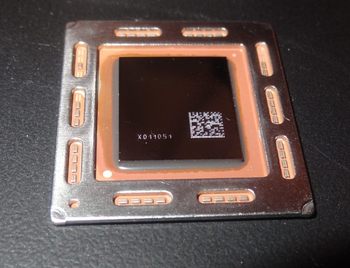Advanced Micro Devices has announced a new strategy that could lead to A games that A run in the future across PCs and games consoles like the Xbox and PlayStation.

AMD's next-generation chip code-named Kaveri
The company announced Wednesday its "Unified Gaming Strategy," which the company hopes will make games playable on PCs and gaming consoles with minimal modifications in code.
AMD will work with developers on writing games that can be run across PCs, mobile devices and through the cloud, AMD executives said at a press conference Wednesday at the Computex trade show in Taiwan.
The company already has a strong following among gamers who use its desktop PC chips and Radeon graphics processors. Its chips -- the x86 CPU code-named Jaguar and Radeon GPU -- will be used in the PlayStation 4 and Xbox One.
Writing games for consoles has been specific to the hardware, and the current Xbox 360 and PlayStation 3 are not based on x86 processors. AMD now has an opportunity to break the barriers and unite gaming on consoles and PCs, said Matt Skynner, corporate vice president and general manager of the graphics division at AMD.
"If we can create a gaming experience on the console and client as well as in the cloud... we're going to build our brand, we're going to build our market share, we're going to win," Skynner said.
AMD's depth of intellectual property gives the company an advantage over its rival Intel, which cannot boast of a presence in the console market, according to Skynner. AMD's PC shipments have been dropping, and the company has an advantage over Intel and ARM in graphics, but its CPU technology is not considered as advanced.
AMD also demonstrated a high-definition game running on its next-generation PC processor code-named Kaveri. AMD focused on the performance of its chips during the press conference, which is in sharp contrast with Intel and ARM who are battling on power efficiency.
The Kaveri chip is the company's fastest PC chip to date, and will ship to PC makers later this year, said Lisa Su, senior vice president and general manager of AMD's Global Business Units, during the press conference.
Kaveri could also be a step in bringing console gaming closer to the PC level, though the results could be a few years out. Kaveri sets a new standard in harnessing the combined processing power of the CPU and GPUs with new integrated technologies, Su said.
"Kaveri is the future of processing," Su said.
Kaveri is the first chip based on the specification established by the AMD-led HSA (Heterogeneous System Architecture), which aims to make applications portable across different devices including PCs, game consoles, tablets and smartphones. The specification abstracts the processing units in a system, making it easier for developers to write code without worrying about the specific processors on which it will be executed.
"It is absolutely the end goal to create a development ecosystem where first-party games will be written to the games consoles first ... but providing the capability to leverage that investment into PC market, into mobile form factors, into cloud. Definitely there's that desire," said Su in an interview after the press conference.
Kaveri will have a new technology called HUMA, in which CPUs and GPUs will have access to pooled memory resources in a system. Earlier, the CPU and GPU memory were separate, and did not interact with each other in real time.
AMD is working with developers to expand the number of applications compatible with HSA, Su said. A lot of the console games are developed on the PC first, and HSA can broaden the number of applications that work with AMD chips across devices.
"Instead of just first-party games, we're really broadening the number of applications that can run in an accelerated way on HSA. We'll keep expanding it," Su said.
Games typically require different performance and power levels on consoles, PCs, cloud and mobile devices. HSA will act as a pivot to define the games and performance relative to the device.
With Kaveri the number of applications using HSA can be expanded, Su said. "There's a lot more that can be done."





